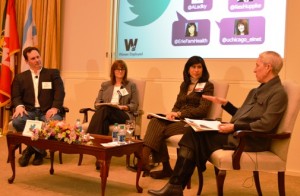I’m beyond delighted to bri ng you this post from my friends over at Women Employed, a Chicago-based advocacy organization that mobilizes people and organizations to expand educational and employment opportunities for America’s working women. Below, Adriana Díaz, the Communications Manager at Latino Policy Forum and a leader of the Advocacy Council at Women Employed, muses poignantly and shares knowledge on how we work. Follow her on Twitter @adriana9diaz. -Deborah
ng you this post from my friends over at Women Employed, a Chicago-based advocacy organization that mobilizes people and organizations to expand educational and employment opportunities for America’s working women. Below, Adriana Díaz, the Communications Manager at Latino Policy Forum and a leader of the Advocacy Council at Women Employed, muses poignantly and shares knowledge on how we work. Follow her on Twitter @adriana9diaz. -Deborah
A few weeks ago, I lost several hours of sleep to an irregular bout of insomnia. I went to work grouchy, brain hazy, and started to complain to my coworker—when I realized that she, as a mother of two children under the age of 3, ran on an average of five hours of sleep a night. A sleepless night seemed trivial in the moment, but in our water cooler conversation we gained perspective in our lifestyle differences, and in our shared privileges as women employed by our office—we both work for a company that values family support and work-life balance and offers flexible scheduling for salaried employees to meet those needs. For example, my coworker works 8 to 4 to accommodate her family’s childcare needs. I work 10 to 6. Bonus: we both get to work from home once a week.
While it may seem like a small perk to some, my coworker and I recognize that having flexibility in our workplace is a huge benefit to our quality of life. To be sure our conversation was an “a-ha!” moment for me on workplace issues; one of many I’ve had since becoming an Advocacy Council member at Women Employed (WE) more than a year ago. For too many working women—the benefits my coworker and I view as a given, control over our schedules, paid sick days, maternity leave—are out of reach.
So how do we create conditions in which all of us can thrive?
Beyond Balance, a panel discussion hosted by WE, dived into this very question last week. The engaging conversation was moderated by WE Executive Director Anne Ladky and included panelists Susan Lambert, University of Chicago, Associate Professor in the School of Social Service Administration; Iliana Mora, COO at Erie Family Health Center and WE Board member; and Rex Huppke, Chicago Tribune journalist of the popular workplace column, “I Just Work Here.”
The full program is available to watch on CAN-TV, but here are a few more a-ha moments I had that I hope you can learn from too:
- There is no work-life balance for low-wage workers.
- As 80 percent of minimum wage workers are adults, and 59 percent are women, Illiana Mora reminded us that for many balance is out of the question, “It’s work, work, work, work, work, work and more work. What they’re talking about is really, survival.”
- Paying workers well, providing fair schedules and paid time off is not just great for employees, it’s great for business! Employee morale, health and loyalty suffer in industries with low wages and unpredictable schedules. This leads to high turnover among other incurred costs. Susan Lambert said, “We want strong businesses, we want firms to employ people and a strong economy. But the literature shows if you treat people well it pays off too.”
- Millennials deserve their due credit for revolutionizing the workplace. The demographic is now the largest portion of the workforce and has a strong commitment to social justice.
- Rex Huppke made the point that Millennial men want to be involved with their families: “Every generation will have its negative side…but Millennials have come along and said, ‘if you don’t provide me with the kind of things I find important, basically the work-life balance issues, then forget it, I’m going somewhere else.’ And then they just leave.”
Catch more highlights here. Interested in learning more about creating fairer workplaces? Visit Women Employed’s website.


Comments